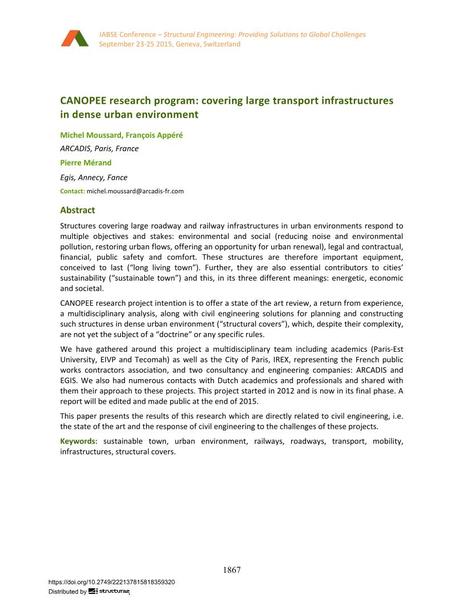CANOPEE research program: covering large transport infrastructures in dense urban environment

|
|
|||||||||||
Détails bibliographiques
| Auteur(s): |
Michel Moussard
(ARCADIS, Paris, France)
François Appéré (ARCADIS, Paris, France) Pierre Mérand (Egis, Annecy, Fance) |
||||
|---|---|---|---|---|---|
| Médium: | papier de conférence | ||||
| Langue(s): | anglais | ||||
| Conférence: | IABSE Conference: Structural Engineering: Providing Solutions to Global Challenges, Geneva, Switzerland, September 2015 | ||||
| Publié dans: | IABSE Conference Geneva 2015 | ||||
|
|||||
| Page(s): | 1867-1878 | ||||
| Nombre total de pages (du PDF): | 12 | ||||
| Année: | 2015 | ||||
| DOI: | 10.2749/222137815818359320 | ||||
| Abstrait: |
Structures covering large roadway and railway infrastructures in urban environments respond to multiple objectives and stakes: environmental and social (reducing noise and environmental pollution, restoring urban flows, offering an opportunity for urban renewal), legal and contractual, financial, public safety and comfort. These structures are therefore important equipment, conceived to last (“long living town”). Further, they are also essential contributors to cities’ sustainability (“sustainable town”) and this, in its three different meanings: energetic, economic and societal. CANOPEE research project intention is to offer a state of the art review, a return from experience, a multidisciplinary analysis, along with civil engineering solutions for planning and constructing such structures in dense urban environment (“structural covers”), which, despite their complexity, are not yet the subject of a “doctrine” or any specific rules. We have gathered around this project a multidisciplinary team including academics (Paris-Est University, EIVP and Tecomah) as well as the City of Paris, IREX, representing the French public works contractors association, and two consultancy and engineering companies: ARCADIS and EGIS. We also had numerous contacts with Dutch academics and professionals and shared with them their approach to these projects. This project started in 2012 and is now in its final phase. A report will be edited and made public at the end of 2015. This paper presents the results of this research which are directly related to civil engineering, i.e. the state of the art and the response of civil engineering to the challenges of these projects. |
||||
